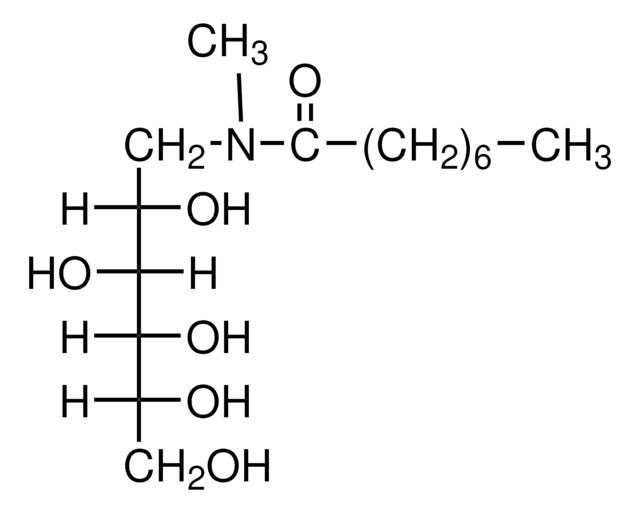N1138
N-Nonanoyl-N-methylglucamine
≥98%
Synonym(s):
N-(D-Glucityl)-N-methylnonanamide, N-Methyl-N-nonanoyl-D-glucamine, MEGA-9
About This Item
Recommended Products
description
non-ionic
Quality Level
Assay
≥98%
form
powder
mol wt
335.44 g/mol
technique(s)
protein expression: suitable
CMC
19-25 mM (20-25°C)
suitability
suitable for molecular biology
application(s)
life science and biopharma
SMILES string
CCCCCCCCC(=O)N(C)C[C@H](O)[C@@H](O)[C@H](O)[C@H](O)CO
InChI
1S/C16H33NO6/c1-3-4-5-6-7-8-9-14(21)17(2)10-12(19)15(22)16(23)13(20)11-18/h12-13,15-16,18-20,22-23H,3-11H2,1-2H3/t12-,13+,15+,16+/m0/s1
InChI key
GCRLIVCNZWDCDE-SJXGUFTOSA-N
Looking for similar products? Visit Product Comparison Guide
Application
Storage Class Code
11 - Combustible Solids
WGK
WGK 3
Flash Point(F)
Not applicable
Flash Point(C)
Not applicable
Personal Protective Equipment
Certificates of Analysis (COA)
Search for Certificates of Analysis (COA) by entering the products Lot/Batch Number. Lot and Batch Numbers can be found on a product’s label following the words ‘Lot’ or ‘Batch’.
Already Own This Product?
Find documentation for the products that you have recently purchased in the Document Library.
Our team of scientists has experience in all areas of research including Life Science, Material Science, Chemical Synthesis, Chromatography, Analytical and many others.
Contact Technical Service








